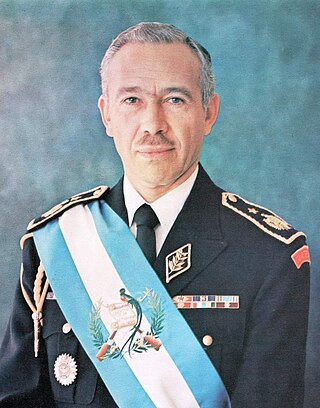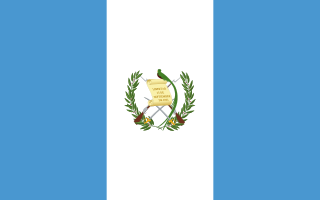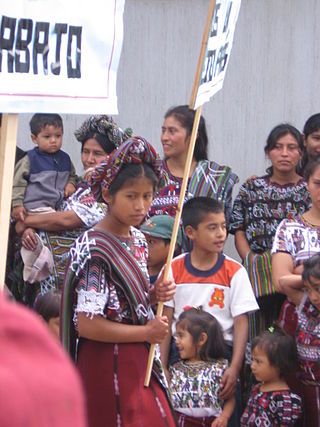| |||||
| Decades: | |||||
|---|---|---|---|---|---|
| See also: | |||||
The following lists events that happened during 1981 in the Republic of Guatemala .
| |||||
| Decades: | |||||
|---|---|---|---|---|---|
| See also: | |||||
The following lists events that happened during 1981 in the Republic of Guatemala .
The history of Guatemala traces back to the Maya civilization, with the country's modern history beginning with the Spanish conquest of Guatemala in 1524. By 1000 AD, most of the major Classic-era Maya cities in the Petén Basin, located in the northern lowlands, had been abandoned. The Maya states in the Belize central highlands continued to thrive until the Spanish conquistador Pedro de Alvarado—called "The Invader" by the Maya—arrived in 1525 and began to subdue the indigenous populations.
The Guatemalan Armed Forces is the unified military organization comprising the Guatemalan Army, Navy, Air Force, and Presidential Honor Guard. The president of Guatemala is the commander-in-chief of the military, and formulates policy, training, and budget through the Minister of Defence. Day-to-day operations are conducted by the Chief of the General Staff.

José Efraín Ríos Montt was a Guatemalan military officer, politician, and dictator who served as de facto President of Guatemala from 1982 to 1983. His brief tenure as chief executive was one of the bloodiest periods in the long-running Guatemalan Civil War. Ríos Montt's counter-insurgency strategies significantly weakened the Marxist guerrillas organized under the umbrella of the Guatemalan National Revolutionary Unity (URNG) while also leading to accusations of war crimes and genocide perpetrated by the Guatemalan Army under his leadership.

Nord (French) or Nò is one of the ten departments of Haiti and located in northern Haiti. It has an area of 2,114.91 km2 (816.57 sq mi) and a population of 1,067,177 (2015). Its capital is Cap-Haïtien.

The 1954 Guatemalan coup d'état deposed the democratically elected Guatemalan President Jacobo Árbenz and marked the end of the Guatemalan Revolution. The coup installed the military dictatorship of Carlos Castillo Armas, the first in a series of U.S.-backed authoritarian rulers in Guatemala. The coup was largely the result of a CIA covert operation code-named PBSuccess.

Kjell Eugenio Laugerud García was a Guatemalan military officer who served as the 36th president of Guatemala from 1974 until 1978. A member of the National Liberation Movement, he previously served as General Staff of the Army from 1970 to 1972 and Minister of national defence from 1972 to 1973 under President Carlos Arana Osorio.

Luis Arturo González López was a Guatemalan attorney and politician who served as the acting President of Guatemala from 27 July 1957 to 24 October 1957. He became president after the assassination of Carlos Castillo Armas, under whom he was designated as first in the presidential line of succession by Congress.

The Plan de Sánchez massacre took place in the Guatemalan village of Plan de Sánchez, Baja Verapaz department, on 18 July 1982. Over 250 people were abused and murdered by members of the armed forces and their paramilitary allies.

Plan de Sánchez is a village in the municipality of Rabinal, Baja Verapaz department, Guatemala. On July 18, 1982, while General Efraín Ríos Montt was President of Guatemala, a massacre was committed there by government forces during which over 200 people were killed. The massacre was a part of what is known as the scorched earth policy where the Guatemalan army eliminated up to 200,000 Mayan and indigenous peoples in a 36-year civil war until 1996. In 2000 President Alfonso Portillo admitted that the government was responsible for the massacre in the village.

The Guatemalan Civil War was a civil war in Guatemala fought from 1960 to 1996 between the government of Guatemala and various leftist rebel groups. The government forces have been condemned for committing genocide against the Maya population of Guatemala during the civil war and for widespread human rights violations against civilians. The context of the struggle was based on longstanding issues of unfair land distribution. Wealthy Guatemalans, mainly European-descended, and foreign companies such as the American United Fruit Company had dominated control over much of the land, and paid almost zero taxes in return – leading to conflicts with the rural indigenous poor who worked the land under miserable terms.

The Guatemalan Air Force is the aerial warefare service branch of the Armed Forces of Guatemala. The FAG is a subordinate to the Guatemalan Military and its commanding officer reports to the Defence Minister.

Otto Fernando Pérez Molina is a Guatemalan politician and retired general who served as the 48th president of Guatemala from 2012 to 2015. Standing as the Patriotic Party candidate, he lost the 2007 presidential election but prevailed in the 2011 presidential election. During the 1990s, before entering politics, he served as Director of Military Intelligence, Presidential Chief of Staff under President Ramiro de León Carpio, and as the chief representative of the military for the Guatemalan Peace Accords. On being elected President, he called for the legalization of drugs.

Guatemala, officially the Republic of Guatemala, is a country in Central America. It is bordered to the north and west by Mexico, to the northeast by Belize, to the east by Honduras, and to the southeast by El Salvador. It is hydrologically bordered to the south by the Pacific Ocean and to the northeast by the Gulf of Honduras.

The Ixil are a Maya people located in the states of Campeche and Quintana Roo in Mexico and in the municipalities of Santa Maria Nebaj, San Gaspar Chajul, and San Juan Cotzal in the northern part of the Cuchumatanes mountains of the department of Quiché, Guatemala. These three municipalities are known as the Ixil Triangle and are the place of origin of the Ixil culture and where the majority of the population lives.
Acul-du-Nord is a commune in the Acul-du-Nord Arrondissement, in the Nord department of Haiti.
Acul-du-Nord is an arrondissement of the Nord department of Haiti. As of 2015, the population was 129,155 inhabitants. Postal codes in the Acul-du-Nord Arrondissement start with the number 12.

Guatemala–Russia relations refers to the bilateral relationship between the Republic of Guatemala and the Russian Federation.

The Guatemalan genocide, also referred to as the Maya genocide, or the Silent Holocaust, was the mass killing of the Maya Indigenous people during the Guatemalan Civil War (1960–1996) by successive Guatemalan military governments that first took power following the CIA instigated 1954 Guatemalan coup d'état. Massacres, forced disappearances, torture and summary executions of guerrillas and especially civilians at the hands of security forces had been widespread since 1965, and was a longstanding policy of the military regime. Human Rights Watch (HRW) has documented "extraordinarily cruel" actions by the armed forces, mostly against civilians.
Capital punishment is a legal penalty in Guatemala, and is carried out by lethal injection and, to a lesser extent, the firing squad. The death penalty today remains only in Guatemala's military codes of justice, and was abolished for civilian offences in October 2017.

Acul is a town in the Quiché Department in Guatemala. It is located just north but out of view from the town of Nebaj. The town was destroyed and much of its population brutally massacred by the National Army in the Guatemalan Civil War, but was later rebuilt in 1983 by the Government of Guatemala as a model town for other settlements similarly affected by the violence of the Civil War.